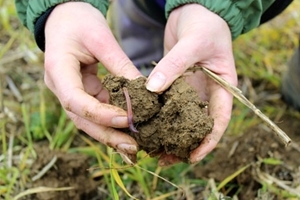 When you think of the GWCT, images of pheasants, partridges, and maybe even lapwings come to mind. But there’s something we deeply care about that might surprise you: soil.
When you think of the GWCT, images of pheasants, partridges, and maybe even lapwings come to mind. But there’s something we deeply care about that might surprise you: soil.
Soil is incredibly important for our well-being. It’s the foundation of our health, providing us with the food we eat. In fact, more than 97% of our food comes from soil, according to the United Nations. Soil also has the power to help us fight global warming by storing carbon. And when it comes to preventing floods, healthy soil can play a big role.
It might surprise you to learn that soil is one of the most diverse habitats in the world. A recent paper showed that it’s home to a whopping 90% of the world’s fungi, 85% of its plants, and over half of its bacteria. Despite all these amazing things, soil doesn’t get much attention in conversations about protecting nature.
GWCT’s Allerton Project: Pioneering research in soil health
With 72% of UK land used for farming, soil is crucial. The GWCT’s Allerton Project has been studying soil for many years, and this research has taught us a great deal. The Project continues to provide long-term, robust scientific evidence on soils and soil health, at field, farm and catchment scales. Importantly, this extensive knowledge is gathered in a real, working environment and supports the development, demonstration and adoption of effective, economically viable and sustainable soil management policies and practices.
It could be argued that we take soil for granted, or indeed are dismissive of its importance. In the US it is referred to as ‘dirt’, and even here the word ‘soiled’ has an unsavoury undertone. The UK is currently witnessing the annual loss of millions of tonnes of arable topsoil due to erosion. This degradation of soil risks our capacity to cultivate food, support biodiversity, and retain carbon and water. Astonishingly, a report from 2020 revealed that a mere £284,000 – equivalent to 0.41% of the environmental monitoring budget – was allocated for assessing the health of the nation’s soil. In stark contrast, an amount exceeding £60.5 million – more than 200 times as much – was spent on monitoring water quality.
A paradigm shift: Soil as a public good
The strategy of treating soil as a private asset and solely the responsibility of farmers and landowners has proven ineffective over the past seven decades. We contend that soil should be regarded as a public good within both agricultural and environmental policies. Encouragingly, there are promising indications of a shift. Thanks to the GWCT’s advocacy, soil has been incorporated into the government’s 25 Year Environment Plan, mentioned alongside air and water as part of our natural capital. This plan also entails an objective of “improving our approach to soil management”, with the aspiration that “by 2030 we want all of England’s soils to be managed sustainably, and we will use natural capital thinking to develop appropriate soil metrics and management approaches”.
In support of this, the Environment, Food, and Rural Affairs Committee is embarking on an inquiry into soil health. This investigation is centred on evaluating the government’s support to farmers in curbing soil degradation and revitalising soils across the nation.
So, let’s appreciate soil for all the incredible things it does for us. And let’s work together to make sure it stays healthy and strong for generations to come.